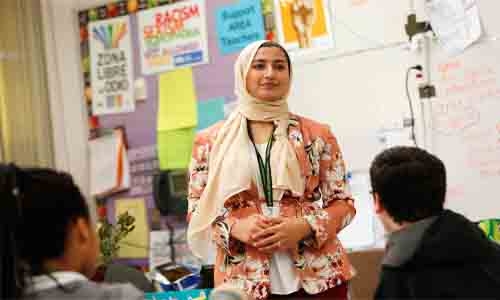Female Bahraini educators at the frontlines of Covid-19
Ever since the outbreak of the Covid-19 pandemic, female and male Bahrainis in the health sector have been at the frontlines making history by means of impressive success stories and sacrifice anecdotes that have been vividly touched and witnessed by the Bahraini community. In addition to this vital sector, the pandemic has highlighted the prominence of other sectors, perhaps the most important of which now is the educational sector, whose affiliates have been dedicated to provide education from a distance and digitalise traditional FTF instruction in record time.
Male and female educators have been striving hand in hand to fulfill this pursuit and overcome challenges of connectivity and delivery. However, female educators have specifically been at the frontline striving to do their best while facing additional unprecedented and exceptional challenges. Perhaps the recent celebration of the International Teacher’s Day together with the Kingdom’s upcoming celebration of the Bahraini Women’s Day, annually commemorated by the Supreme Council for Women, calls for the recognition of the indispensable role that the Bahraini female educators have been playing in the frontlines to ensure the sustainability of the teaching and learning process using different learning managements systems and online teaching tools that would help achieve the intended learning outcomes and graduate attributes set forth by the Kingdom’s educational institutions and governmental bodies before and during COVID-19.
To an elevated degree of professionalism, the transformed role of female educator has become pivotal as they have become the key provider of knowledge and the sole facilitator of the manifold modes of content delivery. Upon receiving instructions to digitalise the teaching-learning process during the pandemic, female educators at schools and universities wasted no time in transforming their teaching practices to ensure the swift provision and delivery of outcome-based content and quality assessment in carefully designed interactive and collaborative manners whilst exercising their leadership skills, classroom management and time management skills in the online milieus of the learning management systems.
Not only that but their succour has transcended beyond their official working hours as they continue guiding and replying to their students’ inquiries all day using different social media networks and online tools. This transformation in the educational scene has also necessitated the elevation of these educators’ ICT skills and knowledge of the latest instructional technologies, interactive websites, and virtual applications.
To further enhance their competences, a vast number of these female educators have taken part in a myriad of training and continuous professional development opportunities catered by local and international educational institutions and bodies whilst also engaging in self-learning and knowledge transfer by means of participating scientific activities such as webinars and online workshops. Any observer of the scientific activities aimed to serve the local and international community and spread knowledge by the University of Bahrain, for instance, can notice that a large proportion of these activities are initiated and managed by its female affiliates.
That said, perhaps the greatest challenge a female educator faces is reflected in the simultaneous inevitability of her presence as a teacher with her need to fulfil her role a mother. While teaching her students in the online class, she endures the responsibility of following up on her own children’s online class attendance, and while resolving the technical issues her students have, she has to also help her children maintain good access. Not only that but she ensures that her students and her children receive her educational and psychological support whilst of course attending to the domestic chores.
By selflessly supporting integrated virtual education and accepting more challenging responsibilities, Bahraini female educators have, with unrivalled dedication, succeeded in maintaining a triangulated balance between fulfilling their national and professional duties as teachers, satisfying their personal commitments as mothers of online students, and hoisting their own professional development to meet the expected duties and commitments.
They have thrived to utilize the latest innovative, non-traditional, student-centered, and evidence-based teaching methods bearing in mind not only the interest of their own children, but the interest of all students, worried parents, and the local community. For that, they deserve utmost societal appreciation as major partners and key stakeholders in sustaining the national development during COVID-19, an aim equally shared by their fellow male educators, and by dedicated doctors, engineers, scientists, economists and other frontlines.
Related Posts

